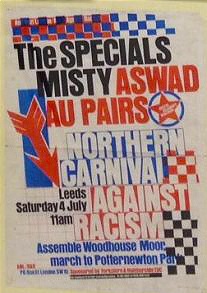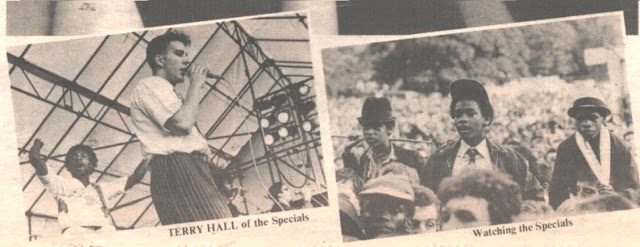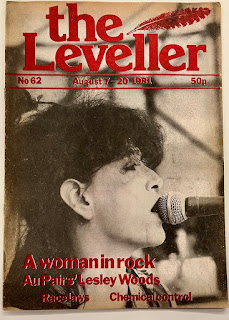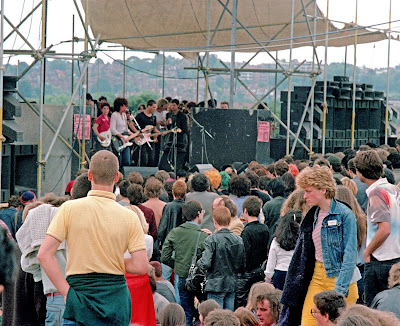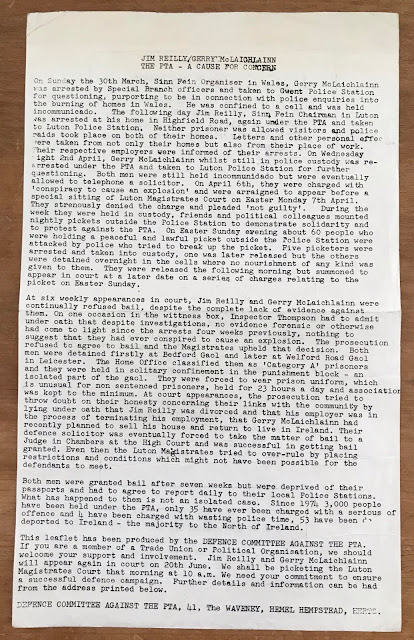 |
| Centrespread montage from Temporary Hoarding, August 1981 with images from the summer riots |
Wednesday, December 21, 2022
Northern Carnival Against Racism in Leeds 1981: Specials and more
Wednesday, January 19, 2022
The Au Pairs - 1981 Interview with Lesley Woods
'9 August 1980. Ninth anniversary of internment, and the Au Pairs are playing a free gig for the kids in West Belfast. Rock The Block - it's in support of the women in Armagh and the men on the blanket in H-Block. The band deliver a tight set, mostly songs written by singer Woods about sexual politics, roles and relationships. The audience are stunned by Lesley; they've never seen anyone like her.' (Kate Webb, in The Book of the Year, Ink Links, 1980)
The Au Pairs were one of the most interesting of UK post-punk bands, exploring subject matter rarely if ever explicitly addressed in music from the sexual politics of relationships to the abuse of Irish women prisoners (the subject of their song Armagh). Their politics was a thread through everything they did, from their guitar playing to their choice of benefit gigs. They played for Rock Against Racism (indeed were started out by people involved in Birmingham RAR), Rock Against Sexism and various other causes.
This interview is from the radical left magazine 'The Leveller' (August 7-20 1981). True to style it took place at a No Nukes Music gig the band were playing at Lambeth Town Hall in Brixton (just round the corner from The Leveller's office at 52 Acre Lane SW2).
 |
| (click image to enlarge) |
Extracts from interview:
'I don't think you can have any political awareness, though, without being aware of the way women are exploited in this society; it's a patriarchal society and women are oppressed. People are so paranoid about being told that, but it just happens to be a fact, not a point of view, a fact, and an inevitable result of the way society is organised right down to the basics. Capitalist society relies on the family, and women exist for the family and for producing children. In our society anybody who's involved in production gets exploited... I just read that today! Brecht's The Mother. It's really good. I get fed up always having to apologise or to defend the argument that women are oppressed. It is a fucking fact; not my point of view, or the left's point of view. I don't know what the solution is. I don't see a solution. But I could say that if every woman in the world decided to stop fucking with men and just became separatist then you'd be forcing the issue!'
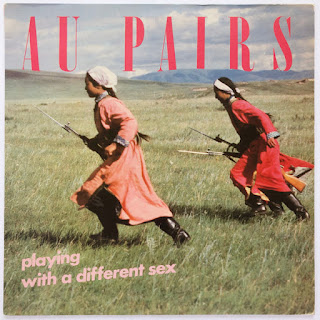 |
| I used to have t-shirt with this on! |
Tuesday, May 04, 2021
The Hunger Strike, the Irish War and an English Town: Luton 1973-81
I grew up 300 miles away in Luton, an English town albeit one with a large Irish community. The events had a profound impact on me as a teenager just getting involved in radical politics, it was heartbreaking following the news day by day of prisoners getting sick and dying in the face of the chilling, cold-hearted indifference of Margaret Thatcher and her Government. All the more so in that the five demands of the prisoners were quietly conceded shortly afterwards:
- The right not to wear a prison uniform;
- the right not to do prison work;
- the right of free association with other prisoners;
- the right to organize their own educational and recreational facilities;
- the right to one visit, one letter and one parcel per week.
Luton had a significant role in the Irish republican movement in the 1970s and early 1980s, and was the scene of one of the last Hunger Strike demonstrations.
Frank Stagg and The Luton Three
An earlier hunger strike had been mounted by Irish prisoners in English jails in 1976, demanding a transfer to prison in Ireland. In the course of this protest Frank Stagg died in Wakefield Prison and Michael Gaughan died in Parkhurst. Frank Stagg had first joined Sinn Fein in Luton in 1972.
 |
| Frank Stagg |
In November 1973, three members of Luton Sinn Fein - Sean Campbell, Phil Sheridan and Gerry Mealey - known as the Luton Three, were convicted of ‘conspiring to rob persons unknown'. No robbery had taken place and it was claimed that 'They were the victims of a trap laid by police agent Kenneth Lennon at the instigation of Special Branch. At the trial Lennon’s name and his role in the affair was concealed by the prosecution denying the defence any opportunity of contesting the basis of the police case. All three were sentenced to ten years' (Fight Racism! Fight Imperialism! No 12, September 1981). In another twist Lennon (who lived in Francis Street, Luton) then encouraged an 18 year old Luton man, Patrick O'Brien, to take part in a plot to help the Luton prisoners escape from Winson Green prison in Birmingham. This seems to have been another Special Branch sting. Lennon later confessed his role as an agent provocateur to the National Council for Civil Liberties, shortly before he was found shot dead in the Surrey countryside.
The Luton Three all had a tough time in prison. Mealey spent seven weeks on hunger strike in 1976 as part of the same protest in which Frank Stagg died. While in Albany jail on the Isle of Wight, Campbell was badly beaten up by prison officers during a prisoners protest in 1976, sustaining a broken leg, jaw and ribs. Shortly after his release in 1982 he was admitted to hospital after suffering a severe stroke, but he went on to become a Sinn Fein councillor in Cookstown, County Tyrone until his death in 2002.
In another incident in 1976 John Higgins, an electrician and the National Organiser of Sinn Fein in England, was arrested in Luton and later jailed for four years after being convicted of soliciting arms as well as walkie-talkie radios (Belfast Telegraph 7/4/77). He was convicted on the dubious evidence of John Banks, an ex-paratrooper and mercenary recruiter with links to the British intelligence. Higgins had earlier been the focus for an entrapment attempt from Kenneth Lennon.
 |
| 'MI5's own mercenary - ex-Para set up Irish Republicans' |
There was also the odd case in 1977 when Luton Sinn Fein member Michael Holden was approached by Luton Labour Councillor Finbar McDonnell and asked if he knew about an IRA plan to bomb the Vauxhall car factory in the town - a false story apparently originating with police/security services. As Holden commented at the time: 'I don’t think that the IRA would bomb the Luton factory. They have never bombed factories. And, anyway we have 16 or 17 members of Sinn Fein working at Vauxhalls’. I asked who would benefit if such a thing happened — only our enemies would benefit. I said if a bombing was carried out there it would completely destroy all Sinn Fein activity not only in Luton but in the whole area' (statement in Hands off Ireland, November 1977).
The Luton 2: Jim Reilly and Gerry MacLochlainn
The case of the 'Luton 3' was followed in 1980 by that of the 'Luton 2', which I remember personally. Jim Reilly was a familiar figure on the Luton Left, and had been a union shop steward at Vauxhall as well as the Home Counties organiser for Sinn Fein. He lived in Highfield Road in Luton's Bury Park area. He had been arrested previously in 1976, as reported at the time in Red Weekly (International Marxist Group paper):
His arrest in March 1980 was reported in Fight Racism! Fight Imperialism! (no.4, May/June 1980):
'On Sunday and Monday 30 and 31 March two leading members of Provisional Sinn Féin (Britain) – Gerry MacLochlainn South Wales Organiser and Jim Reilly Home Counties Organiser – were arrested under the racist anti-Irish Prevention of Terrorism Act.
Sinn Fein and Hands off Ireland staged pickets of Luton police station, on one of which - on Easter Sunday - police piled in. 10-15 police rushed from the station and kicked and punched the demonstrators back from the entrance. This was followed by the arrest of five Hands Off Ireland supporters – four of whom were subsequently charged with ‘breach of the peace’.
That morning Jim and Gerry appeared in court and were charged with conspiracy to cause explosions. The conditions under which Jim and Gerry are being held also violate their rights as remand prisoners. Both men are forced to wear prison uniform and are being held on 23 hour lock-up in solitary confinement and denied association or recreation. Since being moved to Leicester prison, they have been held in the punishment block'.
Another Luton Vauxhall car worker, Willie Higgins, was also arrested under the PTA in April 1980, but was released without charge.
On 28 June 1980 there was a demonstration from People's Park in Luton calling for the dropping off charges against 'The Luton 2', as well as those arrested in the police station protest. Around 150 people took part in the demonstration which was addressed by Jim Reilly (by then out on bail) when it paused by Luton police station. The march had been arranged by Hands Off Ireland, the Revolutionary Communist Group's Irish campaign.
(The RCG did not have a branch in Luton, but there were a few members in nearby Hemel Hempstead including one of my teachers from Luton Sixth Form I believe. I recall them turning up at a Luton CND meeting around this time at the Communist Party HQ at 8 Crawley Green Road and trying unsuccessfully to get them to adopt a Troops Out of Ireland position. They spent a great deal of time denouncing other left factions for not having the 'correct' line on Ireland, but to give them their dues they did prioritize solidarity when for much of the Left the fact that British troops were on the streets just across the sea was treated as background noise, just another issue on the menu of causes)
 |
| Report of the Luton demo in June 1980, from FRFI, July/August 1980 |
I remember going to a public meeting at the International Centre in Old Bedford Road called by the Defence Committee Against the Prevention of Terrorism Act at which both Jim and Gerry spoke- the latter also having just been released on bail. I believe this was the meeting on June 19th 1980 mentioned in the following article, it also included a showing of a film 'Prisoner of War' about the prisoners' struggle.
The death of Jim Reilly
Sadly, Jim Reilly was to die shortly afterwards at the age of 54. A long time asthma sufferer, he was admitted to hospital with a chest complaint and died at St Mary's Hospital in Luton.
Born in the New Lodge area of Belfast in 1927, Jim Reilly was first interned in Crumlin Road prison as a young republican in 1942. After emigrating to England, he founded the Luton branch of Provisional Sinn Fein in 1971 and was arrested at least four times in the 1970s. For instance in 1975 Reilly and three other people from Luton including John Higgins were arrested in Liverpool as they left the Belfast boat on their way back from a Sinn Fein conference (Belfast Telegraph 31/10/75).
Reilly's treatment in prison was widely held to have contributed to his ill health, not to mention his earlier experiences of being on hunger strike as a teenage prisoner in the 1940s: 'Jim Reilly, Luton Sinn Fein and Home Counties Organiser, died in hospital on Friday 26 September 1980. Jim Reilly was a lifelong revolutionary Republican fighter working right up to the moment of his death. His death was a direct result of the frame-up organised against him and his close comrade Gerry MacLochlainn (now serving a six year sentence). Having hounded Jim Reilly throughout his life, British imperialism succeeded in hounding him to death in September 1980. Jim Reilly’s death was a great loss both to the Republican movement and the British working class. He will always be remembered as a courageous dedicated Republican and convinced socialist' (Fight Racism! Fight Imperialism! No 12, September 1981).
As a final indignity, British Airways refused to fly his body back to Belfast, resulting in his funeral at St Peter's on the Falls Road being delayed. He was buried in Milltown Cemetery.
 |
 |
| Jim Reilly Obituary, from Fight Racism! Fight Imperialism, Nov/Dec 1980 |
 |
 |
Class struggle (Revolutionary Communist League), 2 October 1980 |
 |
| An Phoblact (4 October 1980) - obituary and sympathy notices [found at the excellent Republican Archive] |
 |
| Troops Out, December 1982 |
 |
| Kevin Lynch |
 |
| Troops Out, October 1981 |
At the time of the Luton riot in July 1981, the local Herald newspaper said: 'The scene could have been Belfast, or even Brixton or Liverpool' (16 July 1981). I think it's important to remember that the Hunger Strike was going at the same time as the 1981 uprisings in English town and cities. I have no doubt that the young people rioting in Brixton and Toxteth on the one hand, and Belfast and Derry on the other took inspiration from each other - the TV news was dominated throughout the year by such scenes. Many black and Irish activists definitely saw each other as both being in the front line against British imperialism - to take but one example, radical black magazine Race Today published a text by Bobby Sands. And of course the British state was also not slow in making such connections - in July 1981, the army demonstrated its water cannon to police chiefs and senior police officers from England visited their counterparts in the Royal Ulster Constabulary to learn about their methods of riot control.
(1) Belfast Telegraph, 24 September 1981
(2) 'Troops Out demand by Sinn Fein’, Luton News 1 October 1981
(3) Special Category: The IRA in English Prisons, Vol. 2: 1978-1985 by Ruán O’Donnel
(4) Luton News, 24 September 1981.
Leaflets from my own colllection, The Splits and Fusions RCG archive was a useful resource
A couple more leaflets on the Jim Reilly/Gerry Gerard MacLochlainn campaign. This from the Defence Committee Against the Prevention of the Prevention of Terrorism Act:
 |
| Back of leaflet advertising events in Luton |
'Luton Magistrate Obstructs Bail' - Hands Off Ireland press release:
Saturday, August 17, 2019
Blinded by the Light - memories of 1980s Luton racism and job cuts
 |
| 'Body Blow to Bedford: shock as GM job toll hits 4150 since June', TASS (union) News and Journal, October 1986 |
 |
| My LYM membership card |
 |
| 'Skinheads making Nazi salutes threatened anti-racist marchers' (Herald, 21 May 1981) |
 |
| "Teenagers fight racism" (Evening Post, 18 May 1981) |
 |
| Luton Leader, May 1981 |
